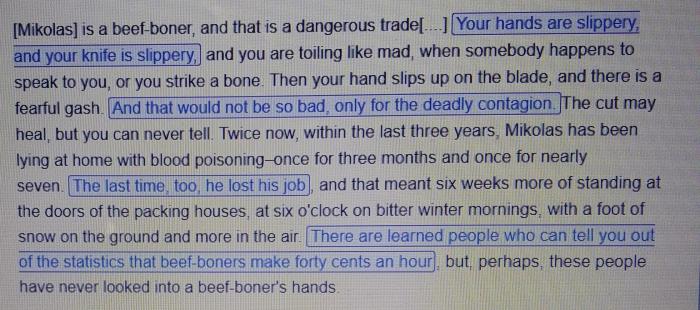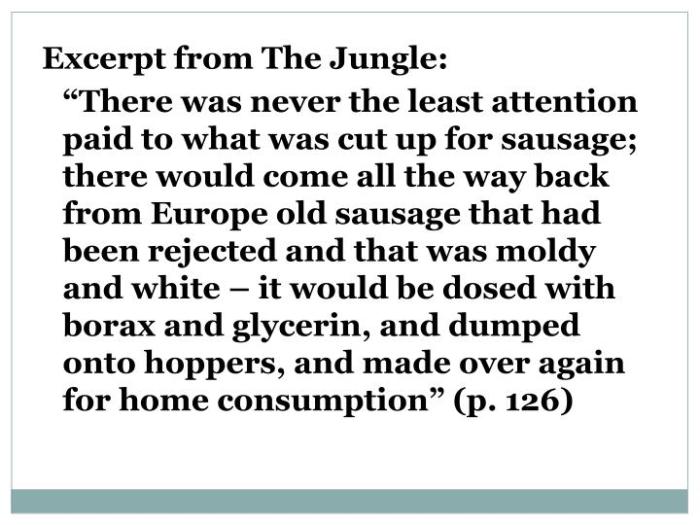Upton sinclair the jungle excerpt – Upton Sinclair’s “The Jungle” is a seminal work of American literature that exposed the unsanitary and exploitative conditions within the meatpacking industry. This excerpt from the novel provides a glimpse into the horrors that Sinclair witnessed, highlighting the novel’s enduring relevance and impact.
Sinclair’s vivid descriptions and unflinching portrayal of the workers’ plight shocked the nation, leading to widespread outrage and calls for reform. The excerpt serves as a testament to the power of literature to expose social injustices and inspire change.
Introduction

Upton Sinclair’s novel “The Jungle” (1906) is a groundbreaking work of American literature that exposes the horrific conditions of the meatpacking industry in early 20th-century Chicago. Upon its publication, the novel caused a national uproar and led to significant social reforms.
The novel follows the experiences of Jurgis Rudkus, a Lithuanian immigrant who arrives in Chicago with dreams of a better life. However, he soon finds himself trapped in a world of poverty, exploitation, and violence. Through Jurgis’s journey, Sinclair reveals the dehumanizing conditions faced by immigrant workers and the corrupt practices of the meatpacking industry.
Excerpt Analysis

One of the most famous excerpts from “The Jungle” describes the process of “killing hogs” in the meatpacking plant where Jurgis works. Sinclair’s vivid language and graphic imagery create a horrifying account of the brutal and unsanitary conditions in the slaughterhouse.
The excerpt begins with Jurgis’s arrival at the plant: “The killing-beds were long tables of iron, and upon these the hogs were thrown and shackled by the hind legs, so that they hung head downward. Then a man with a short, sharp knife slashed their throats, and they were left to bleed to death.”
Sinclair’s description of the killing process is both gruesome and precise. He uses verbs like “slashed” and “left to bleed” to convey the violence and cruelty of the process. He also emphasizes the unsanitary conditions by describing the “stench” of the slaughterhouse and the “filthy” water that is used to wash the hogs.
Themes and Symbolism
One of the major themes of “The Jungle” is the dehumanization of workers in the meatpacking industry. Sinclair portrays the workers as mere cogs in a machine, stripped of their individuality and treated with contempt by their employers.
The use of animal imagery in the novel is particularly effective in conveying this theme. The workers are often compared to animals, such as “hogs” and “cattle,” and are treated with the same brutality as the animals that are slaughtered in the plant.
For example, in the excerpt, Jurgis is described as being “shackled by the hind legs” and “left to bleed to death.” This imagery suggests that Jurgis is being treated no better than an animal, and that his life is just as expendable.
Character Development
Jurgis Rudkus is the central character in “The Jungle.” He is a Lithuanian immigrant who arrives in Chicago with dreams of a better life. However, he soon finds himself trapped in a world of poverty, exploitation, and violence.
Jurgis is a complex and sympathetic character. He is hardworking and determined, but he is also naive and trusting. He is often taken advantage of by those around him, but he never gives up hope of a better life.
Through Jurgis’s journey, Sinclair reveals the struggles faced by immigrant workers in early 20th-century America. Jurgis’s story is a reminder of the importance of social justice and the need to protect the rights of all workers.
Social and Historical Context
“The Jungle” was published in 1906, at a time when the United States was undergoing rapid industrialization. The novel’s depiction of the meatpacking industry shocked and horrified readers, and it led to a public outcry for reform.
In response to the novel, President Theodore Roosevelt appointed a commission to investigate the meatpacking industry. The commission’s report confirmed Sinclair’s findings, and it led to the passage of the Pure Food and Drug Act of 1906, which established federal regulation of the food industry.
“The Jungle” had a profound impact on American society. It helped to raise awareness of the plight of immigrant workers and the need for social reform. The novel also contributed to the development of the Progressive Era, a period of social and political activism in the United States.
Critical Reception and Legacy, Upton sinclair the jungle excerpt
“The Jungle” was a critical and commercial success. It was praised for its realism and its powerful indictment of the meatpacking industry. The novel has been translated into more than 30 languages and has sold more than 100 million copies worldwide.
“The Jungle” is considered one of the most important works of American literature. It is a powerful indictment of the social and economic conditions of the early 20th century, and it continues to resonate with readers today.
The novel has been adapted into several films and television shows, and it has been the subject of numerous academic studies. “The Jungle” is a classic work of American literature that has had a lasting impact on society.
FAQ Insights: Upton Sinclair The Jungle Excerpt
What is the main theme of Upton Sinclair’s “The Jungle”?
The main theme of “The Jungle” is the exploitation of workers in the meatpacking industry and the resulting social injustice.
How did “The Jungle” impact American society?
“The Jungle” led to widespread public outrage and calls for reform, resulting in the passage of the Pure Food and Drug Act and the Meat Inspection Act.
Why is Upton Sinclair’s “The Jungle” still relevant today?
“The Jungle” remains relevant today as it highlights the ongoing struggle for workers’ rights and the importance of food safety.